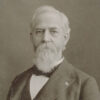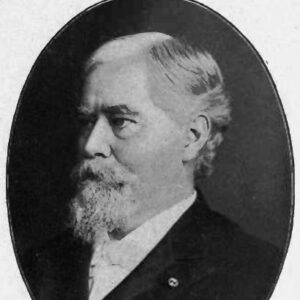calsfoundation@cals.org
John Charles Black (1839–1915)
A Medal of Honor recipient for valor during the Battle of Prairie Grove and brevet brigadier general of volunteers, John Charles (Charlie) Black later served as a U.S. congressman and as the national commander in chief of the Grand Army of the Republic (GAR).
Born on January 27, 1839, in Lexington, Mississippi, to the Reverend John Black and Josephine Culbertson Black, Charlie Black was the eldest of their four children. After Rev. Black died in 1847, Josephine Black moved her family to Danville, Illinois, to be near her brother James Culbertson. Soon thereafter, she married Dr. William Fithian. Fithian served in the Illinois state legislature with Abraham Lincoln in 1834, and Lincoln successfully represented Fithian in a lawsuit in 1850. During the 1858 senatorial campaign, Lincoln stayed at the family’s Danville home during his travels for the Lincoln-Douglas debates and spoke briefly to a crowd of well-wishers on September 21.
At the outbreak of the Civil War, Black was enrolled at Wabash College in Crawfordsville, Indiana. Along with brother William Black, Charlie Black initially served a three-month enlistment with the Eleventh Indiana Infantry and fought in the Battle of Romney, West Virginia, on June 11, 1861. In August 1861, he mustered out with the rank of sergeant major. Soon thereafter, Black joined Company K of the Thirty-Seventh Illinois Infantry as captain. He quickly earned promotion to major during regimental elections of officers on September 5, 1861.
Severely wounded in the right arm during the Battle of Pea Ridge on March 7, 1862, Black earned promotion to lieutenant colonel on July 12, 1862. Black never regained use of his right arm.
Black earned a Medal of Honor at the Battle of Prairie Grove on December 7, 1862, when he led his regiment in a charge uphill against the Confederate position near the Borden house. Although severely wounded in his left arm during this action, Black and his regiment captured an enemy artillery battery. As with many Medals of Honor presented for actions performed during the Civil War, Black’s medal was awarded more than thirty years after the cited action. Black received his medal on October 31, 1893. His brother William Perkins Black received the Medal of Honor on October 2, 1893, making them the first of five pairs of brothers to receive the Medal of Honor for Civil War service.
Black earned promotion to colonel on December 31, 1862, and participated in the capture of Arkansas Post, the Vicksburg campaign, the Red River campaign, and the capture of Fort Blakeley in Alabama, and he frequently held temporary command of various brigades in the Department of the Gulf. With the close of hostilities, Black resigned his commission and received an honorable discharge on August 15, 1865, returning to Danville. In recognition of his years of meritorious service, particularly his service at Fort Blakeley, Black received a brevet promotion to the rank of Brigadier General of Volunteers in March 1866, with rank dating from April 9, 1865.
In 1867, Black passed the Illinois bar exam and established a law practice in Danville. Throughout his life and career, Black held a variety of positions with governmental and veterans’ organizations. In 1872, Black ran unsuccessfully for lieutenant governor and declined a gubernatorial nomination in 1884. He was considered as a potential vice-presidential candidate on the Democratic ticket with Grover Cleveland in 1884 but declined. Black served as the U.S. Commissioner of Pensions from 1885 until 1889. Defeated in congressional bids as a Democrat in 1866, 1876, and 1884, as well as the U.S. Senate in 1879, Black won election to Congress in 1892, where he served until 1895 when he received an appointment as U.S. Attorney for the Northern District of Illinois; he held this office until 1899. An active member of both the Military Order of the Loyal Legion and the GAR, Black served as the national commander in chief of the GAR from 1903 until 1904. From 1904 until 1913, he served as president of the U.S. Civil Service Commission and was also a frequent speaker on the Chautauqua circuit.
Black married Adaline L. (Addie) Griggs of Urbana, Illinois, on September 28, 1867. His wife survived him by thirty years, dying in 1945. They had three children: Gracia Mildred Black, John Donald Black, and Helene Black.
John Charles Black died on August 17, 1915, and is buried in Spring Hill Cemetery in Danville.
For additional information:
Banasik, Michael E., ed. Duty, Honor, and Country: The Civil War Experiences of Captain William P. Black, Thirty-seventh Illinois Infantry. Iowa City, IA: Press of the Camp Pope Bookshop, 2006.
Beyer, W. F., and O. F. Keydel. Deeds of Valor: How America’s Civil War Heroes Won the Congressional Medal of Honor. New York: Smithmark Publishers, 2000.
Eicher, John H., and David J. Eicher. Civil War High Commands. Stanford: Stanford University Press, 2001.
Hunt, Roger D., and Jack R. Brown. Brevet Brigadier Generals in Blue. Gaithersburg, MD: Olde Soldier Books, 1990.
“John Charles Black.” Biographical Directory of the United States Congress. http://bioguide.congress.gov/scripts/biodisplay.pl?index=B000504 (accessed February 22, 2023).
“John Charles Black.” Sons of Union Veterans of the Civil War. http://suvcw.org/garcinc/jcblack.htm (accessed February 22, 2023).
Medal of Honor Historical Society of the United States. http://www.mohhsus.com/medal-of-honor (accessed February 22, 2023).
Shea, William L. Fields of Blood: The Prairie Grove Campaign. Chapel Hill: University of North Carolina Press, 2009.
Shea, William L., and Earl J. Hess. Pea Ridge: Civil War Campaign in the West. Chapel Hill: University of North Carolina Press, 1992.
Wilder, Jeremy H. “The Thirty-Seventh Illinois at Prairie Grove.” Arkansas Historical Quarterly 71 (Summer 2012): 164–180.
Robert Patrick Bender
Eastern New Mexico University–Roswell
 Black, William Perkins
Black, William Perkins Civil War through Reconstruction, 1861 through 1874
Civil War through Reconstruction, 1861 through 1874 Military
Military Politics and Government
Politics and Government John C. Black
John C. Black 




Comments
No comments on this entry yet.